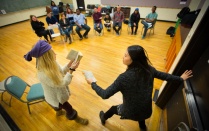How to Succeed in your Language Courses

Perfect your language skills with friends! Here the French Club enjoys a fall outing at The Market at Maison, Albion, NY.
Photo: Sophie May
Learning a language as an adult is an attainable goal, but it requires commitment on your part. Your success will depend on the amount of effort you put into studying. If you organize your time wisely, you can become proficient in a foreign language, but you will need to study, memorize and practice on a regular basis. Remember that you will be taking college-level language courses, which are more rigorous than most high school language courses.
Plan to dedicate AT LEAST one hour of practice for every hour of class. This is the MINIMUM to help you become proficient.
Always Come to Class
Attendance is an essential part of your learning experience. For most students, class time will be the only time in which they are immersed in the language, so make the most out of this opportunity.
If you are not in class, we cannot assess your mastery of the material for the lesson and you cannot receive a grade for the day’s work. If you must be absent, communicate with your peers to make sure you know what was covered for the day you missed and what was assigned for homework.
Read the Syllabus
At the beginning of every semester, you will receive a paper or electronic course syllabus, which specifies course goals, required texts, expected outcomes, requirements, policies and a daily/weekly program. You are responsible for reading and understanding all the information provided on the syllabus. Programs do not waive or exempt students from the policies stated on the syllabus.
Be Prepared
You are not expected to understand every word your instructor says, especially at the elementary levels. At the early stages, instructors will use body language, mime, drawings and other means to help you understand the most important aspects (the gist) of their message.
The material instructors are presenting and practicing with you is exactly what appears in your textbook in English. Prepare for class each day by reading the syllabus. This preparation ensures you can follow the instructor, regardless of the language s/he is using.
What to Expect in the Classroom
All courses are taught in the foreign language to maximize proficiency in the language. This is one of the many differences between college-level courses and high school classes. As mentioned above, instructors will use mime, body language, pictures and other visual cues to convey meaning at the start of the academic year. You are not supposed to understand everything that is said, but the gist of the message.
Instructors vary on their approaches to teaching grammar. For the most part, instructors use an inductive method whereby we practice vocabulary and grammar throughout the class without necessarily stopping to examine individual grammatical rules.
In order to master the grammatical elements of a language, you will have to memorize rules and paradigms, but it is more important to practice grammar in meaningful contexts. You must apply the rules to create phrases in a given context (E.g. using formal commands to get directions).
There are different approaches to error correction in the foreign language classroom. Do not be embarrassed by corrections. Be aware that not all mistakes will be corrected always.
You will be asked to draw comparisons and contrasts between the cultures you are studying and your own. You are not expected to adopt the new culture, but to understand it, and, more importantly, to respect it.
Speak! Study! Speak!
- Use the language actively. Besides learning the rules governing the structure of the language, mastery is acquired by actively practicing those rules. This requires that you express your opinion in every class, in either oral or written form, in front of others. Don't wait until you feel you know everything perfectly or understand everything that is being said.
- Organize your time in daily review sessions. Avoid sitting for 4-5 hours at once; you will soon get tired, bored or confused.
- It may seem that the semester presents a lot of vocabulary. However, everyone is capable of learning it. The key is to practice old and new vocabulary regularly in speaking, listening, writing and reading.
- You can prepare flashcards with vocabulary (nouns, adjectives, verbs) to review, but this is not enough. Create sentences with those words that are related to the communicative goals of the lesson. For example, if you are learning the numbers to be able to give and ask for personal information, create questions and answers that require using the vocabulary for asking this kind of information (which include numbers but also interrogative pronouns, nouns, verbs etc.).
- Make a habit of writing down questions about your homework assignments if you do not understand a concept or exercise. Ask the questions in class, through an email to your instructor or during your instructor’s office hours.
- Study groups help many students to stay on top of the material covered in class. Set up a study group early in the semester and meet regularly to review old and new material.
- Most programs have online resources to further practice and prepare for tests and quizzes. Use them regularly.
Always think in terms of presentation, practice and performance:
- Presentation means reading and analyzing the important parts of the lesson in question.
- Practice means learning, i.e., knowing, not “recognizing,” the forms and when to use them.
- Performance means being able to use the forms in real question and answer formats or in conversation.
Get Help When You Need It
Ask for help. If you are having difficulties in class, you must communicate with your instructor immediately (after class, during office hours, or via e-mail). If the problem persists, communicate with the course director. Do not wait until difficulties escalate into problems.
If it is determined that you need help studying (beyond what a study group or a visit to your instructor can do), you are advised to seek out a tutor. For further information on tutors, please contact us.

